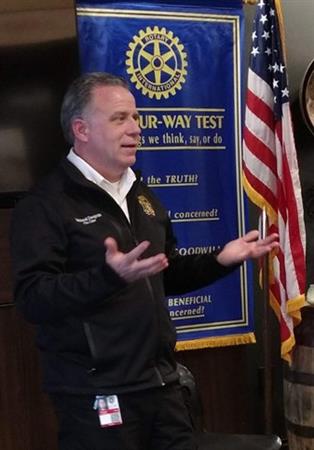
Chief Dispain gave us a little background on his experience and what brought him to Lincoln.
He commented on the heartiness of our Club and reminded us that, unlike many businesses and organizations, the Fire Department cannot close due to bad weather.
He was ready for a change but it had to be a family decision. They brought their daughter to visit UNL. When she decided to attend they decided they may as well move here. The Lincoln community was very welcoming to them making the transition very comfortable.
He served a number of agencies in California which means he has a great deal of knowledge about fire departments - various sizes, with various challenges. When he took the post in Lincoln there were many conflicting opinions among leadership as far as the direction and funding of the Department.
One of his first goals was to make sure to connect with the community - he wanted to understand what was important. He wanted to calm down the concerns and harness the internal energy by bringing all of the passion to a discussion on the future of the Department. He wanted to get the focus back to the people the Department serves.
He created a customer centric focus group. The plan would be that these stakeholders would hold meetings at least annually. First to help determine the direction of the Department in the next year then to follow up with what was accomplished and set the direction for the next year. The group consisted of all demographics of the community - from various sections of Lincoln, different family status, etc.
Basically everyone agrees that they want the Department to show up quick, solve the problem, and be nice.
They want to measure the effectiveness of all of the services that they provide - safety, fire protection, car accidents and transport to hospitals as well as hazardous materials response. They conduct after-service surveys and are happy to report high ratings. As a community, we are very happy with the services and we should all be able to feel confident that they will take care of our needs.
Chief Dispain pointed out that the cardiac survival rate - not just living but being able to return to normal life - is twice as high as the national average. They arrive early enough to provide life-saving services to the patient prior to transport to the hospital.
Stopping fires at the area of origin is important to reducing loss. If they can keep a fire from spreading it is less likely that the owner will be displaced. There may be some water damage and odor from the smoke, but they have saved their home.
Another piece that he presented - how the Departments services affect the community - is the ISO rating (Insurance Services Office).
The ISO fire score determines how well the local fire department can protect our homes in our community. Insurance companies use the score to help set home insurance rates, as a home that is less likely to be severely damaged or destroyed by fire is cheaper to insure. Though the difference in rates varies, a recent survey of home rates in and outside of Lincoln indicates that the homes within the City could have a rate as much as $750 lower because of the superior ISO rating.
Though the ISO rating list is not made available to the general public, Mike shared that the ISO rating for the Lincoln Fire Department is 2 (based on a 1-10 scale, with 1 being best).
When deciding where to buy, a homeowner needs to consider the tax rates in the city and outside, but good to also consider the affect on insurance rates.
Chief Dispain pointed out that the ISO rating, which is based on the aggregate losses in our community, is not the sole factor in determining rates. Other big factors for our personal policies will be claims and, for some insurance companies, credit score.
Returning to the results of the focus group, and the direction taken based on that, Mike stated that the 5th new fire station will open soon. He said some are replacing outdated facilities and some are moves, while others are new to serve different areas of Lincoln. He said that he feels we have the greatest facility needs addressed, an issue that will come up soon is that there are a few stations built in the 40s and 50s that will need to be replaced. He also feels that we are beyond the crisis mode with our equipment though we could still use more.